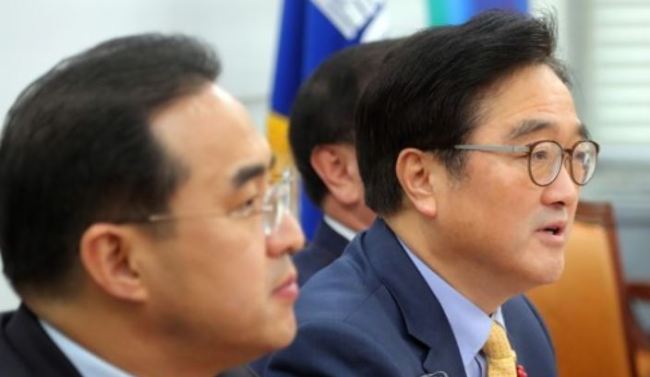Political tensions over a constitutional revision deepened Tuesday, as rival parties blamed one another for a deadlock in talks over extending the term of a special parliamentary panel on the highly polarizing issue.
Last week, the parties failed to pass a motion to extend the panel's term, slated to end this month, due to their differences over when to hold a public vote on rewriting the basic law that many say fails to reflect social and political changes since its last revision in 1987.
The ruling Democratic Party maintains it would back the extension only if the main opposition Liberty Korea Party agrees to its plan to hold a referendum on it in tandem with the local elections slated for next June.
But the LKP opposes the idea of concurrently holding the elections and referendum, saying the revision issue could be politicized in favor of the liberal ruling bloc. It also argues that the amendment needs "sufficient" time for deliberations.
Such gaps have led to a breakup of last-minute negotiations over the extension Friday, raising the prospect of the presidential office Cheong Wa Dae undertaking the job of drafting a revision motion -- anathema to the opposition bloc.

"While our party has made bold concessions, the LKP has maintained an uncompromising attitude," Woo Won-shik, the ruling party's floor leader, said during a meeting with senior party officials.
Woo cautioned that the constitutional revision must not be approached from any partisan perspective, and that the LKP must agree to the idea of holding the referendum on the revision together with the local elections.
The ruling party that only has 121 seats in the 299-member parliament needs opposition parties' cooperation to even submit the bill for a revision.
Tabling the proposal for a constitutional change requires backing from a majority of all lawmakers. The parliamentary passage needs support from two-thirds of the total legislators. It then has to win majority support in a referendum involving a majority of eligible voters.
Amid the LKP's insistence on holding a referendum on the revision after the local elections, speculation has been rising that the ruling party might seek to push for it with cooperation with other opposition parties, such as the People's Party.
But Kim Dong-cheol, the floor leader of the People's Party, rejected the possibility of bypassing the main opposition party in the parliamentary passage of the revision.
"The claim about the skipping of the main opposition party is nothing but a 'political alibi' or a ploy to shift the responsibility for any failure of the amendment efforts," Kim said during a party meeting.
Kim also opposed the prospect of the presidential office leading the revision spadework.
"If Cheong Wa Dae or the government spearheads the revision talks, it would be difficult to solicit public opinions and views from all parties, in which case the possibility of its parliamentary endorsement would be little," he said.
Shifting the blame to the ruling party for the failure to pass the extension of the revision panel, a group of first-term LKP lawmakers reiterated that the revision referendum must take place after the local elections.
"(The ruling party's argument) is to set the time limit for the revision vote and just cobble together the amendment motion within the time frame," the group said in a joint statement. "It is a move that disregards the aspirations of citizens who expect the Republic of Korea's new Constitution, and a move that virtually opposes a practical amendment."
The discussions over the revision center on reshaping the governance structure to diffuse the power that is concentrated in a president.
Some lawmakers have called for introducing a semi-presidential system -- a mixture of the presidential system and parliamentary Cabinet system -- under which more power is assigned to the prime minister. Others have espoused a purely parliamentary Cabinet system like in Japan.
During his election campaign, President Moon Jae-in called for changing the current single-term, five-year presidency into a four-year presidency that allows for only one re-election. He has said the change would help ensure consistent policy implementation with long-term visions. (Yonhap)



![[AtoZ into Korean mind] Humor in Korea: Navigating the line between what's funny and not](http://res.heraldm.com/phpwas/restmb_idxmake.php?idx=644&simg=/content/image/2024/04/22/20240422050642_0.jpg&u=)
![[Exclusive] Korean military set to ban iPhones over 'security' concerns](http://res.heraldm.com/phpwas/restmb_idxmake.php?idx=644&simg=/content/image/2024/04/23/20240423050599_0.jpg&u=20240423183955)


![[Herald Interview] Why Toss invited hackers to penetrate its system](http://res.heraldm.com/phpwas/restmb_idxmake.php?idx=644&simg=/content/image/2024/04/22/20240422050569_0.jpg&u=20240422150649)
![[Graphic News] 77% of young Koreans still financially dependent](http://res.heraldm.com/phpwas/restmb_idxmake.php?idx=644&simg=/content/image/2024/04/22/20240422050762_0.gif&u=)







![[Exclusive] Korean military to ban iPhones over security issues](http://res.heraldm.com/phpwas/restmb_idxmake.php?idx=652&simg=/content/image/2024/04/23/20240423050599_0.jpg&u=20240423183955)



![[Today’s K-pop] Ateez confirms US tour details](http://res.heraldm.com/phpwas/restmb_idxmake.php?idx=642&simg=/content/image/2024/04/23/20240423050700_0.jpg&u=)